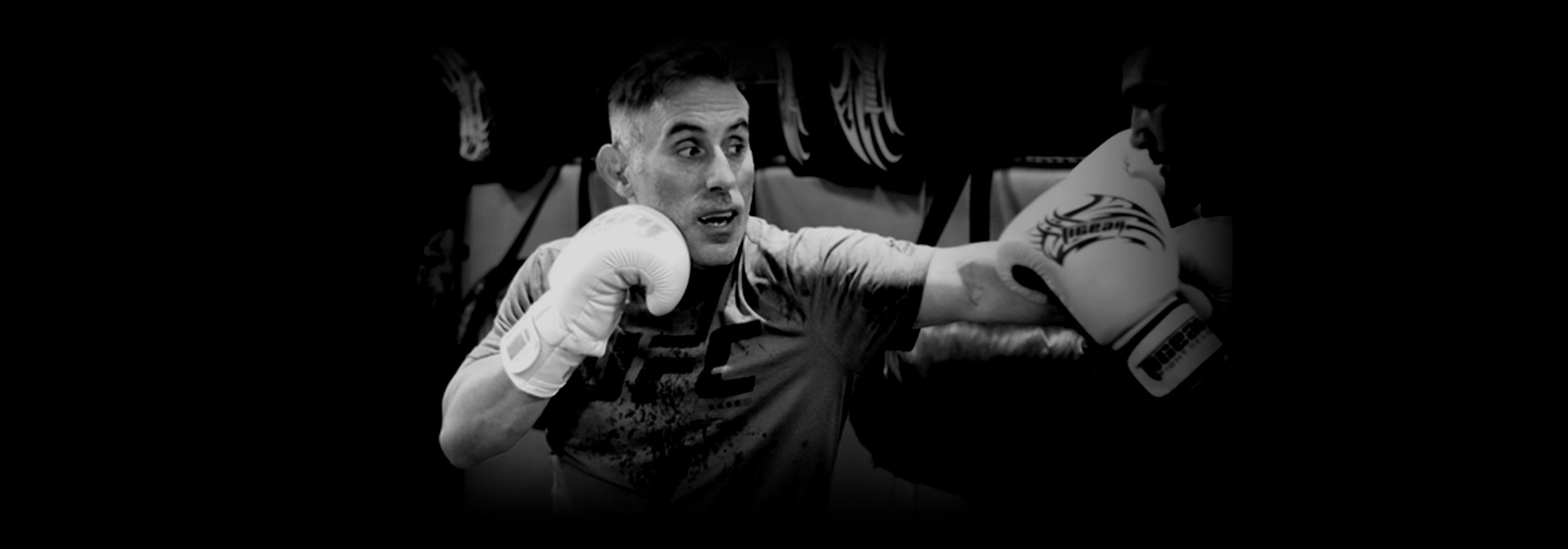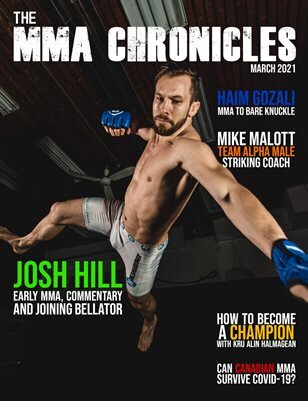Dave has always been known as being a hands on manager in MMA both with guiding his clients careers to literally getting down on the ground and rolling.
As Mixed Martial Arts has exploded into popularity the need for representation and management is at an all-time high. With so many agencies out there which one is right one and how do you know which group will be the right fit for you? Dave Fish is someone who has always been fighting for his clients whether it be as a lawyer in New York State, as an independent agent in MMA & now working with one of the biggest agencies in combat sports, Paradigm Sports, with illustrious clients such as Conor McGregor & Manny Pacquiao. I spoke with Dave on how he got into MMA management, the difference in working for himself and working for a big company like Paradigm Sports and his thoughts on getting an MMA Fighters union.

D
ave on always being a fan of combat sports: “While I have been involved in combat sports for a very long time. I didn’t really come to it from a traditional way that most people do. I started wrestling in College. I did not wrestle in High School or anywhere else as being from New York there were really limited opportunities. The way I got into it was going to college (SUNY Albany). I didn’t know a lot but I knew there was a good wrestling team and a very well known coach there; Coach Joe DeMeo who has sadly since passed away. I remember having the contact info and nervously calling Coach DeMeo. I remember calling and saying I’m Dave Fish I’m coming to SUNY Albany I’m really into wrestling and I was wondering if I could come out for the team? Coach DeMeo replied back and said I really appreciate the call but this isn’t how this works. I have a great recruiting class coming in we don’t teach people how to wrestle in college. My first week at Albany I stumbled on some people who were on the team. I told them my story and the told me the first day was this day and why don’t you come on out. I thought they were kidding but I decided to do that. I remember going to the wrestling room and seeing everyone. What they do on first day is come down to a classroom the coach will come down to the class & everyone will introduce themselves. For whatever reason I was the last guy who got up and spoke I said my name is Dave Fish I’ve never wrestled before but if you give me the chance I won’t quit. I remember the coach saying I talked to you over the summer I told you we don’t do that we don’t teach people to wrestle. I remember leaving feeling dejected but some of the seniors or captains convinced the equipment manager to give me a lock, a pair of shoes and my wrestling gear.

Dave’s passion for amateur wrestling has been a big help with him in recruiting talent: “You see now there is a track record of collegiate wrestling being one of the best bases for long term success in MMA. Look at most of the champions and the majority of the top ten in Bellator, UFC or even regional promotion promotions. A large percentage are ex-wrestlers”
Dave has always been know as being a hands on manager in MMA both with guiding his clients careers to literally getting down on the ground and rolling. Dave’s ability to be hands on helped him go from being a lawyer to an MMA manager “I started training MMA a little bit later in in life maybe 12 to 13 years ago, before Paradigm was even around. My training parners and a couple of the coaches said Dave we could use your help as we’ve got contracts that aren’t good and we aren’t really sure what we are doing. At the time there were very few competent managers. 10-12 years ago was like the stone ages. This was new to me as I had experience in employment law & trial work. This was new but I started doing it a lot because I care about these people and seeing success and what started as an informal side job became more formal and part of my career as I built a combat sports management to my practice and it took off.

The thing that I love so much is that I’ve worked with athletes from their first amateur fight through to being top ten in the UFC. As the sport has grown so has the language in the contracts and what makes a ‘good contract’ versus a ‘bad contract.’ It all comes down to what your leverage is and right now certainly without a union the promotions have the leverage. There are some unicorns & exceptions. But the promotions have the economic leverage and the power. What has changed over the last 10 years is the professionalism. I saw athletes managed by “MMA Managers” who couldn’t even read a contract.



 One of the biggest discussions in MMA over the last decade has revolved around the development of a Union in MMA. Dave gave his perspective on a Union and how it would affect his job: “When you have athletes that are unionized it changes the landscape. As you look at the NFL there is a guarantee that percentage of their revenue goes to the players. That would be the first thing that the athletes are paid what they deserve. Most of the athletes in MMA deserve to be paid 10x what they are paid. That sounds crazy to say but when you look at what these athletes are making in combat sports compared to the other sports it’s far from crazy to say they deserve 10x the amount. If you look at the top 10 paid people in other industries whether in tech in sales in entertainment or pharmaceuticals it’s astronomical. But when people are asked to understand what a top 10 basketball player in the world make what they make people act like they are offended. I think MMA fighters are working harder than or as hard as anybody else. If you are a top ten fighter in your division in the world I think you justify making a lot of money.
One of the biggest discussions in MMA over the last decade has revolved around the development of a Union in MMA. Dave gave his perspective on a Union and how it would affect his job: “When you have athletes that are unionized it changes the landscape. As you look at the NFL there is a guarantee that percentage of their revenue goes to the players. That would be the first thing that the athletes are paid what they deserve. Most of the athletes in MMA deserve to be paid 10x what they are paid. That sounds crazy to say but when you look at what these athletes are making in combat sports compared to the other sports it’s far from crazy to say they deserve 10x the amount. If you look at the top 10 paid people in other industries whether in tech in sales in entertainment or pharmaceuticals it’s astronomical. But when people are asked to understand what a top 10 basketball player in the world make what they make people act like they are offended. I think MMA fighters are working harder than or as hard as anybody else. If you are a top ten fighter in your division in the world I think you justify making a lot of money.
 Dave on how he scouts talent: “I love this part of the job. I’m a fanatic researcher. To me it is enjoyable to be on the internet looking at film of regional promotions most people have never heard of. It’s no secret that at the beginning I’m looking for talent. I’m looking for people who are going to win fights. At the end of the day it’s about winning fights. That’s what creates leverage in negotiation, that’s what creates opportunity to achieve your goal and make money. This is a career for these people and like any of us part of our career is making sure we can sustain ourselves pay our bills and make money. I’m looking for people that are talented and have good records. You don’t typically pick up the 5-5 athlete. The major promotions are looking for the 8-0, the 10-0 with 8 finishes. Not only how successful they are record wise but how are they finishing their opponents? What are their opponents records like? Records of opponents is a very big deal to me. Once I’m watching somebody I’m impressed with their skill and their record it’s at that point I want to talk to somebody. Above all else I want to know that I like you. You want to avoid having to spend 80% on that one difficult person. The easiest way to avoid that is to not bring that on. Lastly the intangibles all matter too. If the person has a great personality. If they know how to use social media in a very positive way. If they are involved in charitable causes. All that stuff is meaningful, it matters to me and adds to my desire to bring someone on.”
Dave on how he scouts talent: “I love this part of the job. I’m a fanatic researcher. To me it is enjoyable to be on the internet looking at film of regional promotions most people have never heard of. It’s no secret that at the beginning I’m looking for talent. I’m looking for people who are going to win fights. At the end of the day it’s about winning fights. That’s what creates leverage in negotiation, that’s what creates opportunity to achieve your goal and make money. This is a career for these people and like any of us part of our career is making sure we can sustain ourselves pay our bills and make money. I’m looking for people that are talented and have good records. You don’t typically pick up the 5-5 athlete. The major promotions are looking for the 8-0, the 10-0 with 8 finishes. Not only how successful they are record wise but how are they finishing their opponents? What are their opponents records like? Records of opponents is a very big deal to me. Once I’m watching somebody I’m impressed with their skill and their record it’s at that point I want to talk to somebody. Above all else I want to know that I like you. You want to avoid having to spend 80% on that one difficult person. The easiest way to avoid that is to not bring that on. Lastly the intangibles all matter too. If the person has a great personality. If they know how to use social media in a very positive way. If they are involved in charitable causes. All that stuff is meaningful, it matters to me and adds to my desire to bring someone on.”